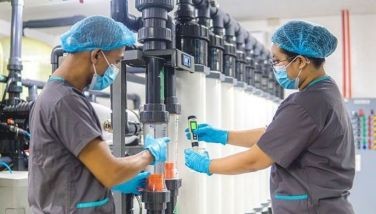6.9% 3Q growth: Good but farmers are left behind
The ASEAN Summit we hosted last week went on successfully as expected. It was quite colorful though. For one, there was that usual attempt by the cause-oriented groups to disrupt it. Likewise, the Abu Sayyafs were at it as well as reported. Interestingly too, it was spiced up by the comments of Canada’s Prime Minister Justin Pierre James Trudeau on the country’s alleged human rights abuses.
However, amid this hoopla, the news that the economy continued to expand was the more captivating. As reported by the Philippine Statistics Authority (PSA), the Philippine economy grew faster than expected in the third quarter, making it the second fastest-growing economy in Asia. Just next to Vietnam and ahead of China. Remarkably, the country’s gross domestic product (GDP) — or the value of all finished goods and services produced in the country — registered a 6.9 percent growth rate in the third quarter.
As usual, manufacturing, trade, real estate, renting and business activities were the main drivers of growth for the quarter, the PSA added. Among the major economic sectors, industry recorded the fastest growth at 7.5 percent followed by services which rose by 7.1 percent. Moreover, the constant growth in exports and improvements in public spending also helped prop up the economy.
As expected, however, the third quarter GDP was slower than the 7.1 percent recorded in the same period last year. 2016 was election year, thus, government spending shot up and politicians’ well-secured treasure chests (including their share of the “pork barrel” loot and “illegal drug” generated money) were unlocked. Therefore, money flowed freely and recipients (of both good and bad money) were on shopping sprees.
Moreover, with OFWs’ inward remittances hitting US$20.781 billion as of September 2017 (or a 3.78 percent increase from the US$20.025 billion booked in the same period last year per BSP), consumer spending has continued to increase. Unfortunately, however, the agriculture sector has not just remained dormant, it went down by 2.5 percent in the third quarter. As usual, the weather was the ready excuse. We say, ready excuse, because other countries where the weather is worse are even exporting agricultural produce.
Truth to tell, in the past decade, the country’s Gross Domestic Product (GDP) grew significantly. In fact, spurred by consumer demand, the resurgence of exports and investments as well as election-related spending, it grew considerably by 7.3 percent in 2010. To PNoy’s credit, however, in his reign our GDP grew a lot faster.
Despite this rosy picture (both GMA’s & PNoy’s reign), however, poverty incidences remained high. Thus, our countrymen are wondering, why in heaven’s name we claim to have grown significantly in more than a decade and yet majority of our brethrens (who are mostly in the agriculture sector) are still languishing in poverty.
For one, economic growth is generally measured in terms of GDP. Increase in GDP does not necessarily trickle down to the grassroots. It simply means that the pace of growth is there but the path or pattern of growth does not cut through the working class or the masses. To put it bluntly, we certainly have “economic growth” but, absolutely, there is no “inclusive growth.”
There are many ways of attaining “inclusive growth”. However, the most tenable approach is through productive employment. This can be addressed by encouraging new investments, both foreign and domestic. Or, should the government must directly intervene, through productive-oriented supports to the most vulnerable sectors.
True enough, we had our own share of foreign direct investments. Notably, however, most of these have been so focused only on business process outsourcing. Obviously, this sector, employs not only the well educated but the best among them. Thus, they don’t directly give opportunities to individuals who are among the inadequately educated, the poorest of the poor, so to speak, who are mostly in the agriculture sector.
To GMA’s and PNoy’s administrations’ credit though, they have addressed this concern by allocating billions of taxpayers’ money to support agriculture. On record, through the Department of Agriculture, billions have been released to address our poor farmers’ concerns for decades. Bastardly though, the support was just on record.
Thus, with Pres. Duterte’s promise to end corruption in his term, hopefully, he shall be able to look into this concern as seriously and as brutal as the way he dealt with the drug menace.
- Latest

























